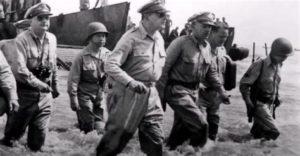“For I have often told you, and now say again with tears, that many live as enemies of the cross of Christ. Their end is destruction; their god is their stomach; their glory is in their shame. They are focused on earthly things, but our citizenship is in heaven, from which we also eagerly wait for a Savior, the Lord Jesus Christ.” Philippians 3:18-20
 Anticipating the return of Christ is part of the joy of being a Christian. We have been promised in the Word that Christ will return and we can be sure of God’s promise. There is actually one return that the Body of Christ anticipates and it is called the rapture. During that return we will go to meet Christ in the air and forever be with Him. At the Second Coming of Christ He will come to earth to establish His kingdom and set in motion the final series of events that will lead to a New Heavens and New Earth. Sound too fantastic to believe? Well, it sounds fantastic,
Anticipating the return of Christ is part of the joy of being a Christian. We have been promised in the Word that Christ will return and we can be sure of God’s promise. There is actually one return that the Body of Christ anticipates and it is called the rapture. During that return we will go to meet Christ in the air and forever be with Him. At the Second Coming of Christ He will come to earth to establish His kingdom and set in motion the final series of events that will lead to a New Heavens and New Earth. Sound too fantastic to believe? Well, it sounds fantastic,  but not too much so to be believed. After all, it is promised and God keeps His promises. He certainly kept His promise about Christ’s first coming and He will for the rapture and the Second Coming, as well. Both the Old and New Testaments are full of promises about the return of Jesus Christ. Over 1800 references appear in the Old Testament and 23 of the 27 New Testament books refer to the Second Coming. These promises should remind us that we are to stand firm in our hope of Christ’s return and reject the spirit of antichrist that dominates the world around us.
but not too much so to be believed. After all, it is promised and God keeps His promises. He certainly kept His promise about Christ’s first coming and He will for the rapture and the Second Coming, as well. Both the Old and New Testaments are full of promises about the return of Jesus Christ. Over 1800 references appear in the Old Testament and 23 of the 27 New Testament books refer to the Second Coming. These promises should remind us that we are to stand firm in our hope of Christ’s return and reject the spirit of antichrist that dominates the world around us.
One of the most inspiring stories of World War II was the promise that General MacArthur made to the people and troops in the Philippines. The day after Pearl Harbor was bombed on December 7, 1941, Japan launched its invasion of the Philippine islands. After struggling against great odds to save the Philippines from Japanese takeover, MacArthur was forced to abandon the islands. MacArthur was disheartened to find out that relief of his forces trapped in the Philippines would not be forthcoming. Left behind were 90,000 American and Filipino troops, who, lacking food, supplies, and support, would soon succumb to the Japanese offensive. Deeply disappointed, MacArthur issued a statement to the press in which he promised his men and the people of the Philippines, “I shall return.” This promise would become his mantra during the next two and a half years, and he would repeat it often in public appearances. The people of the Philippines were heartened by the promise that he would return. That promise became the beacon of light and inspiration to the beleaguered Filipino soldiers, and guerillas mushroomed everywhere constantly battling the Japanese troops.
After struggling against great odds to save the Philippines from Japanese takeover, MacArthur was forced to abandon the islands. MacArthur was disheartened to find out that relief of his forces trapped in the Philippines would not be forthcoming. Left behind were 90,000 American and Filipino troops, who, lacking food, supplies, and support, would soon succumb to the Japanese offensive. Deeply disappointed, MacArthur issued a statement to the press in which he promised his men and the people of the Philippines, “I shall return.” This promise would become his mantra during the next two and a half years, and he would repeat it often in public appearances. The people of the Philippines were heartened by the promise that he would return. That promise became the beacon of light and inspiration to the beleaguered Filipino soldiers, and guerillas mushroomed everywhere constantly battling the Japanese troops.
In the Japanese takeover of the Philippines 70,000 American and Filipino soldiers were captured and were forced to undertake a death march in which at least 7,000 perished. Finally, the last of the 90,000 troops were captured. But the U.S. Joint Chiefs of Staff had no immediate plans for their liberation because resources had to be put elsewhere. However, MacArthur would not give up on his promise and launched major offensives, winning a string of victories with his limited forces in his efforts to work his way back to the Philippines.
in which at least 7,000 perished. Finally, the last of the 90,000 troops were captured. But the U.S. Joint Chiefs of Staff had no immediate plans for their liberation because resources had to be put elsewhere. However, MacArthur would not give up on his promise and launched major offensives, winning a string of victories with his limited forces in his efforts to work his way back to the Philippines.
After many battles in the Pacific the US leadership felt they were once again in a position to invade the Philippines. The Joint Chiefs put their support behind a plan devised by MacArthur. On October 20, 1944, the invasion began and few hours after his troops landed, MacArthur waded ashore onto the Philippine island of Leyte. That day, he made a radio broadcast in which he declared, “People of the Philippines, I have returned!” Unfortunately, only one-third of the men MacArthur left behind in March 1942 survived to see his return. “I’m a little late,” he told them, “but we finally came.”
 MacArthur’s promised return gave hope to the people of the Philippines. He became a national hero. Although his return was delayed, they anticipated it and that anticipation became the energy for their constant battle against the Japanese. As we see in the verses above, there is an opposition to God’s glory, truth, and holiness in our world today. Paul talks of those whose end is destruction serving the god that is their belly, and thus, they glory in their shame. They are seeking whatever satisfies self over the glory of God. We see an opposition to truth and holiness as their minds are set on earthly things. They are neither listening to God’s Word nor seeking to be set apart from the world’s desires.
MacArthur’s promised return gave hope to the people of the Philippines. He became a national hero. Although his return was delayed, they anticipated it and that anticipation became the energy for their constant battle against the Japanese. As we see in the verses above, there is an opposition to God’s glory, truth, and holiness in our world today. Paul talks of those whose end is destruction serving the god that is their belly, and thus, they glory in their shame. They are seeking whatever satisfies self over the glory of God. We see an opposition to truth and holiness as their minds are set on earthly things. They are neither listening to God’s Word nor seeking to be set apart from the world’s desires.
So like the people of the Philippines we are surrounded and we too have been promised a return. Christ said, “I will return” and though there have been two-thousand years pass since that promise, it will take place. In the meantime, we should not be sitting on our hands, idly awaiting His return. There is work to be done. If we sit we will be overtaken by the world. We must anticipate  Christ’s return, but not be discouraged by its delay. MacArthur kept his promise and that was fortunate, but we can be assured that a promise by God will always be kept.
Christ’s return, but not be discouraged by its delay. MacArthur kept his promise and that was fortunate, but we can be assured that a promise by God will always be kept.
As we anticipate the return of Christ, our lives should reflect a standard that is remarkable and unusual to the world. We must not become part of the world as we await Christ’s return, but be people who submit our lives to God’s Word over the whims of society or our flesh. Christ’s promise is real and when He says “I shall return,”
 He shall return. We can bank on it. Remember, we cannot break God’s promises by leaning on them. Someday we will know that the promise “I shall return” will have become “I have returned.” In the meantime, we should do all we can to invite as many people to His homecoming as possible.
He shall return. We can bank on it. Remember, we cannot break God’s promises by leaning on them. Someday we will know that the promise “I shall return” will have become “I have returned.” In the meantime, we should do all we can to invite as many people to His homecoming as possible.